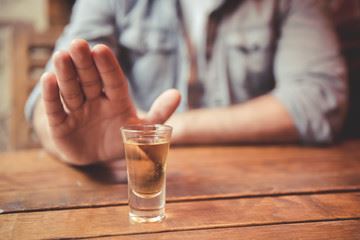
Treatments for excessive alcohol use are often only moderately successful, and clinicians are always on the lookout for more effective interventions. Mindfulness-Based Relapse Prevention (MBRP) is a promising intervention that combines standard cognitive-behavioral relapse prevention with teaching substance users to mindfully resist acting impulsively on urges.
Most existing MBRP research with persons with alcohol use disorders does not compare MBRP to other empirically validated treatments. Skrzynski et al. [Journal of Studies on Alcohol and Drugs] tested the relative efficacy of MBRP to standard relapse prevention alone in reducing alcohol use in heavy alcohol users.
The researchers randomly assigned 182 heavy alcohol users (52% male; 92% Caucasian; average age = 44 years) who volunteered because they wished to reduce their drinking to MBRP or relapse prevention alone. At baseline, participants drank an average of 5 drinks per day, and had 12 heavy drinking days per month when they consumed more than 4 drinks per day. Forty-two percent also used cannabis at least once the past month.
Both treatments were delivered in eight weekly individual therapy sessions delivered over the course of 2 months, with follow-up appointments at weeks 20 and 32. Therapy was delivered by doctoral and post-doctoral psychology students with 3 days of specialized training in motivational interviewing, MBRP, and relapse prevention.
Assessments at baseline, 4, 8, 20, and 32 weeks included an alcohol use questionnaire and timeline follow-back measures of alcohol use based on self-report.
The results showed that both groups significantly reduced their scores on an alcohol use questionnaire, and their average number of drinks per day and total number of heavy drinking days significantly declined from baseline to posttreatment.
While reduction in heavy drinking days was equal for both groups at posttreatment, MBRP participants maintained their improvement in heavy drinking days in subsequent follow-up, whereas the relapse prevention group did not. By the end of the study, the MBRP participants had significantly fewer heavy drinking days than controls.
The efficacy of the treatment was equal for males and females. High levels of cannabis use led to continued decreases in the MBRP group in drinks per day and heavy drinking days in the follow-up period, but to increases in heavy drinking days in controls.
The study showed that MBRP and relapse prevention alone were equally effective in reducing drinks per day and heavy drinking days in alcohol users who wished to reduce their drinking, but only MBRP helped participants maintain their reduction in heavy drinking days out to 32 weeks.
The study is limited by potential participants being aware that the study treatment included mindfulness, and 18% of the sample had a history of experience with mindfulness. It is unclear whether the same results would obtain in a meditation-naïve cohort or one less favorable to the idea of mindfulness.
The study is also limited by the relative inexperience of the students conducting the MBRP and relapse prevention interventions.
Reference:
Skrzynski, C. J., Karoly, H., Ellingson, J., Hangerty, S., Bryan, A. D., & Hutchison, K. E. (2023). Comparing the efficacy of mindfulness-based relapse prevention versus relapse prevention for alcohol use disorder: A randomized control trial. Journal of Studies on Alcohol and Drugs.
Link to study